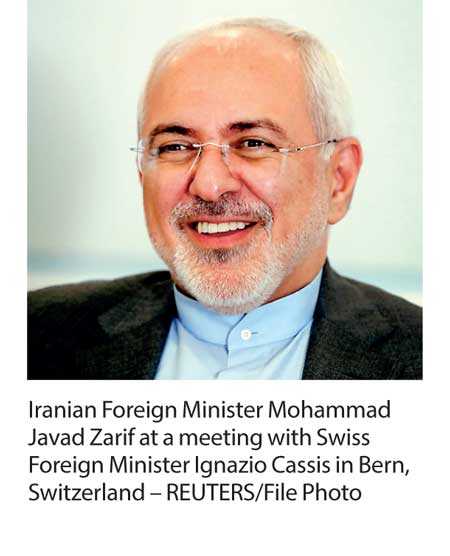Monday Feb 23, 2026
Monday Feb 23, 2026
Thursday, 18 October 2018 00:00 - - {{hitsCtrl.values.hits}}

GENEVA (Reuters): The United States’ latest economic sanctions against Iran display a disregard for the human rights of all Iranians, Foreign Minister Mohammad Javad Zarif said on Wednesday.
The US Treasury on Tuesday sanctioned two Iranian banks and a handful of companies it says are linked to Iran’s Basij militia.
“Latest US sanctions violate 2 ICJ orders: to not impede humanitarian trade & to not aggravate the dispute. Utter disregard for rule of law & human rights of an entire people. US outlaw regime’s hostility toward Iranians heightened by addiction to sanctions,” Zarif said in a Twitter post.
By ICJ, Zarif was referring to the International Court of Justice.
Tensions between Iran and the United States rose after US President Donald Trump withdrew from a multilateral agreement on Iran’s nuclear programme in May and reimposed sanctions in August.
US officials have said a new set of sanctions targeting Iran’s oil industry, will be imposed on Nov. 4.
“US addiction to sanctions is out of control,” Zarif also wrote on Twitter.
He said in the tweet that one of the banks was vital for food and medicine imports and seemed to suggest it was not close to the militia – a volunteer force mainly involved in Iran’s internal security operations – without naming it directly.
“Iranian private bank key to food/medicine import is designated because of alleged EIGHT degrees of separation w/ another arbitrary target. In comparison, all humans on planet are connected by SIX degrees of separation. You do the math,” Zarif said on Twitter.
Earlier, Foreign Ministry spokesman Bahram Qassemi railed against the “spitefulness” of the US government in imposing the sanctions, according to the Islamic Republic News Agency.
Renewed sanctions could shrink Iran’s exports of oil and other goods, leaving the rial currency more volatile and banks facing financial difficulties.
Protests linked to the economic situation in Iran erupted last December, spreading to more than 80 cities.
Sporadic protests, led by truck drivers, farmers and merchants, have continued since then and have occasionally resulted in violent confrontations with security forces.